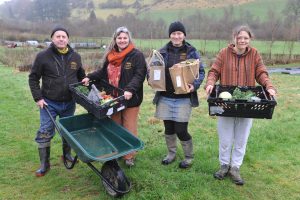 FOLLOWING a debate in the House of Commons, the attitude of Welsh politicians in the UK Parliament was thrown into sharp focus by comments made by both Conservative minister Guto Bebb and Wrexham’s Labour MP Ian Lucas.
FOLLOWING a debate in the House of Commons, the attitude of Welsh politicians in the UK Parliament was thrown into sharp focus by comments made by both Conservative minister Guto Bebb and Wrexham’s Labour MP Ian Lucas.
It was Mr Lucas’ remarks which attracted the most notable reaction by Welsh politicians in the first instance.
He asked Mr Bebb: “Does the Minister agree that leaving the European Union offers a golden opportunity to assess the level of subsidy paid to farming in Wales to see whether that money can be more effectively and efficiently spent in other areas?”
The inference to be drawn from the question was crystal clear and was pounced upon by Plaid Cymru.
CALL FOR COMMITMENT ON AGRICULTURE
Carmarthenshire’s Jonathan Edwards MP, who was sitting in front of Ian Lucas MP in the Commons, called for Labour to urgently clarify whether it will cut financial support for Welsh farmers.
Plaid Cymru Shadow Cabinet Secretary for Rural Affairs, Simon Thomas, said: “Ahead of the Referendum, the people of Wales were promised that no funding would be lost by leaving the European Union. Since then, Plaid Cymru has made it our duty to fight to protect the funding that Wales receives, but Labour seems to view it as a chance for a smash and grab on Wales’ funding.
“We know that 80% of Welsh farms are dependent on European funding to support their businesses, but Labour has shown complete disregard for the interests of the people of Wales and its agriculture sector.
“Labour really has let the mask slip. Whilst Plaid Cymru is focusing on protecting the interests of Welsh communities, Labour is plotting to cut their funding.”
Mr Edwards said: “Labour’s blatant and worrying attack on Welsh agriculture is yet another sign that the Labour party simply does not understand the Welsh agriculture sector or the challenges faced by our rural communities.
“The Welsh family farm is not only a core component of the Welsh agricultural sector and the Welsh economy, but is the main channel through which we as a nation can achieve food and environmental security.
“This expression of contempt for our agricultural sector is utterly unjustified. Welsh farmers face tremendous financial challenges in selling their produce and Labour should be focusing their efforts on facilitating Welsh agricultural exports, rather than marking them as a target for austerity and cuts.
“The Labour MP’s constituency partner, the Cabinet Secretary for Environment and Rural Affairs Lesley Griffiths, urgently needs to answer whether her constituency’s partner’s question reflects official Labour Party policy.”
FARMERS ARE ‘WEALTHY LANDOWNERS’
The Labour MP was unrepentant about his remarks and has gone on to further criticise the Welsh farming community, stated that Welsh farmers are ‘wealthy landowners’.
The Herald invited the Cabinet Secretary for Environment and Rural Affairs to respond to her Westminster colleague’s remarks.
A spokesperson for the Welsh Government told us: “The First Minister made it clear to the Prime Minister earlier this week he is seeking assurances that Welsh farmers do not lose out financially as a result of Brexit. This means every penny currently received from the EU being replaced by the UK Government. The Cabinet Secretary for Environment and Rural Affairs also reiterated this to the UK Government’s Farming Minister.
“As we prepare to withdraw from the European Union, we must use the opportunity over the coming years to assess the specific needs of the farming industry in Wales and identify how we can forge distinctly Welsh policies that will enable Welsh farming to prosper in a post-Brexit world.”
‘NOT A PENNY LESS’
Welsh Liberal Democrat William Powell told The Herald: “In the economic conditions that we now face as a country, pressure on the public purse will be all the more acute. The Welsh Liberal Democrats are supporting the ‘Not a Penny Less’ campaign in terms of farm support, and this has proved popular on our stand at this year’s Royal Welsh Show.
“However, it is more important than ever for farmers to engage in the public debate, so that there is a better understanding of the vital contribution that they make as custodians of the land, in terms both of maintaining biodiversity, but also to the whole tourist sector, which we know is such a critical part of the wider rural economy.
“However, more important than anything for Welsh farming is securing long -term access to the European Single Market for our quality farm exports – and making that an essential element in the permanent post Referendum settlement. And with Andrea Leadsom MP’s comments about hill farmers ‘looking after the butterflies ’, betraying an evident lack of understanding and empathy for Welsh farming, it is vital that Wales retains a robust and distinct farming policy. Welsh Liberal Democrats will be fighting for this in the time to come.”
LABOUR INSULTS RURAL COMMUNITIES
Andrew RT Davies was trenchant in his criticism both of Mr Lucas and Lesley Griffiths: “These comments once again highlight Labour’s attitude towards rural communities, and it is remarkable that their MPs are actively lobbying to give less money to farmers.
“It follows comments from Leslie Griffiths, the Cabinet Secretary who insulted Welsh farmers by suggesting that they don’t make good business owners. Now they want to take their money away.
“During the campaign, senior UK government ministers gave guarantees that Welsh farmers would not be worse off after the UK leaves the EU, and I will continue to work with those colleagues to ensure that those promises are delivered.”
THE LESS CERTAIN MR BEBB
However, an examination of Guto Bebb’s responses to Commons questions on Wales’ farming sector reveals a less certain picture.
The Undersecretary of State was questioned repeatedly on the impact of Brexit on the funding provided to Welsh farmers.
In response to Ian Lucas’s question, rather than giving a ringing ‘no’ and committing the UK Government to maintaining funding levels, Mr Bebb said (emphases added): “We need to look at the way in which Government spend money. IF there is to be a funding mechanism in the future for Welsh agriculture, it MUST BE LOOKED at in the totality of Government spending.”
That is some way short of promises made by senior UK Government ministers that Wales’ farmers would not be worse off.
And to further underline how conditional UK Government’s support is, responding to a question from Liz Saville-Roberts, Plaid’s MP for Dwyfor Meiryonnydd, the limited reassurance given was an ‘assurance to the farming unions that the current funding situation is in place until 2018’.
That echoed a previous response to Mark Williams, Liberal Democrat MP for Ceredigion, in which the conditionality of UK Government support for Welsh agriculture was again underlined: “… The ongoing support for Welsh farming will be subject to agreements involving this Government, the way in which we exit the European Union and the decisions taken by the future Prime Minister.”
That is, again, a long way short of Andrew RT Davies’s reference to a promise that Welsh farmers would not be worse off.
The reluctance to commit to a definitive answer is striking, bearing in mind that in the same questions to the Welsh Office, Mr Bebb stated that: “The farming sector is the economic backbone of the Welsh rural economy. The total income from farming in Wales is estimated at more than £175 million, but more important is the contribution that Welsh agriculture makes to our rural communities.”
He also remarked that: “More than 60,000 jobs in Wales are dependent on the agriculture sector, and it would be short-sighted in the extreme for any Government to turn their back on a sector that puts Wales on the international map.”
‘FARMING IS WALES’ BEDROCK’
Speaking at the Royal Welsh Show last week, Glyn Roberts, President of the FUW, made a series of emphatic observations on the importance of Wales’s agricultural sector: “There are almost as many people engaged in the milk industry in Pembrokeshire as there are people making a living in our Welsh steel industry. Yet there is a clear imbalance in political focus for supporting these two very important industries – an imbalance which also extends to all our agricultural sectors.”
He added that his aspiration and, indeed, the intention of the Farmers’ Union of Wales is to change this.
“We want to see the value and importance of the rural economy truly recognised, and to build a visible and valued Rural Powerhouse – not something that attracts industrial focus in a small geographic area, like the north-east Wales ‘powerhouse’ built around foreign manufacturing; what is needed is recognition of the fact that 80% of our land mass is rural; that more than a third of Wales’ population live in rural areas; and that farming is the bedrock of our rural communities, without which vast direct and indirect contributions to Wales’ economy as a whole would disappear.”

















Add Comment